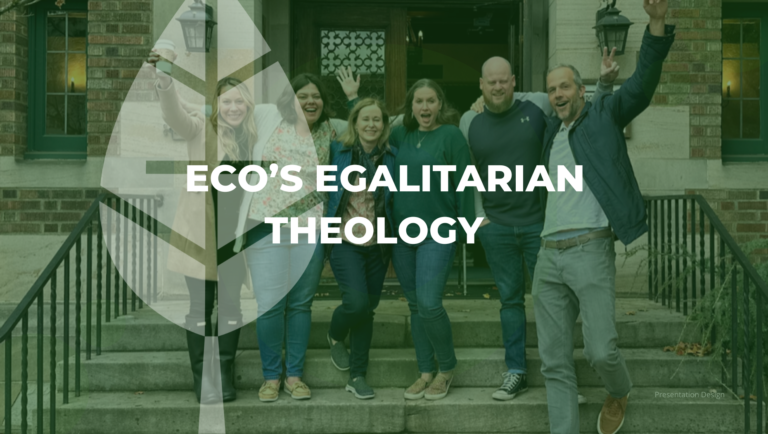 Egalitarian Ministry, Leadership
Egalitarian Ministry, Leadership
Both men and women are important to the Church. This sentence doesn’t seem like...
 Egalitarian Ministry
Egalitarian Ministry
By: ECO Team
In the last newsletter, I talked about four key objectives that would be the necessary focus for our denomination in the next three years. I introduced each of those objectives briefly, but indicated that these four priorities would be the framework upon which many decisions and initiatives would be built. The first area was the recruiting, developing and deploying a greater diversity of leadership. This includes both increasing the number of women coming into ECO in various positions as well as increasing our ethnic diversity. I want to take the rest of this article to dig a little deeper into our egalitarian nature of ministry. You may have noticed that our Essential Tenets don’t actually use the word egalitarian in them – instead they acknowledge that women and men are equally called to all offices and roles of the church.
I have had many conversations with our Synod Executive Council, as well as pastors and staff at local churches, about the challenges of living into egalitarian theology. I have grouped these challenges into two categories below.
The first challenge was to address the question, “How can we help men and women work better together?” This fall we have had a group of ECO leaders, including all of our Synod Executive Staff, in a multi-week learning community with Rob Dixon on this topic. Rob wrote a book called Together in Ministry: Women and Men in Flourishing Partnerships and works for InterVarsity specifically helping staff teams of men and women work well. I highly encourage you to get this book and read it with your staff. I will admit I went into this group thinking that helping men and women work together well was going to be relatively low hanging fruit. What I have found, however, is that there is more complexity to the challenges and opportunities related to this question and it has been wonderful to process those with other pastors. Rob Dixon will be doing one of our shorter talks at the national gathering on this subject in addition to a breakout and preconference to explore this topic in greater detail. I am encouraged that we are normalizing the conversation around this topic and I hope it yields much healthier and productive environments for men and women as we work together.
The second challenge involves what Jim Singleton mentioned as one of our challenges back at our 2017 gathering. In this talk he articulates an egalitarian theology of ministry and also speaks about the challenges of fully living into this reality. One of the huge challenges is related to hurdles of women being called to senior pastor positions. To be clear, not every person, man or woman, is called to senior pastor roles and those roles are no more important than associate or assistant roles. But I notice a few things when it comes to filling senior pastor openings. First, I have been involved in several of our ordination retreats where I have given final reports to people, including three women whom I thought had the gifts, skills and wiring to thrive in senior pastor roles. I shared my thoughts with each woman on behalf of the ordination team, and in each instance the women all said, “No one has ever told me that before!” So we realize we need to continue to encourage women to enter ministry and, if wired and gifted accordingly, to be able to see themselves in the roles of senior pastor (or church planter). We also need to help Pastor Nominating Committees (PNCs) change their preconceived ideas about their next pastor. Usually PNCs will use the language of “he” when talking about their theoretical next pastor. We encourage churches to require their PNC members to watch the talk with Jim Singleton and adhere to the Essential Tenets.
We also know we have a lot of work to do in equipping both men and women to take these senior pastor roles and we need to support them when they do. So we are exploring modifying future Pastor Learning Communities to focus on preparing for senior leadership. We know that when someone moves from seminary or an associate/assistant position to a senior role, the learning curve is steep and we want to invest in those who want these roles. In doing so, we also want to be intentional about inviting and encouraging women to be a part of this group. We hope engaging with a group interested in senior leadership will also help us get a better understanding of potential people to fulfill these roles given that we are facing a high turnover in these situations.
I love when I am out and about in broader contexts to be able to share that ECO is decidedly Reformed, Evangelical, and Egalitarian. While that may seem like a small niche, I am finding there are more and more people looking at going into ministry that fit this category. I am also finding that there are very few environments that could claim these three words. I look forward to more concerted efforts in these areas and the impact it will make on our denomination in years to come. As you can see, it’s an exciting time to be a part of ECO! We are so grateful to have each of you on this journey with us.
In Christ,
Dana Allin
 Egalitarian Ministry, Leadership
Egalitarian Ministry, Leadership
Both men and women are important to the Church. This sentence doesn’t seem like...
 Egalitarian Ministry
Egalitarian Ministry
We strongly desire to grow in our ethnic diversity, but realize that if we are t...